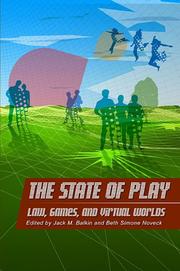| Listing 1 - 3 of 3 |
Sort by
|
Book
ISBN: 0262294540 1283302705 9786613302700 0262295458 9780262295451 9781283302708 9780262015462 0262015463 Year: 2011 Publisher: Cambridge (Mass.): MIT Press,
Abstract | Keywords | Export | Availability | Bookmark
 Loading...
Loading...Choose an application
- Reference Manager
- EndNote
- RefWorks (Direct export to RefWorks)
An investigation of what makes digital games engaging to players and a reexamination of the concept of immersion.Digital games offer a vast range of engaging experiences, from the serene exploration of beautifully rendered landscapes to the deeply cognitive challenges presented by strategic simulations to the adrenaline rush of competitive team-based shoot-outs. Digital games enable experiences that are considerably different from a reader's engagement with literature or a moviegoer's experience of a movie. In In-Game, Gordon Calleja examines what exactly it is that makes digital games so uniquely involving and offers a new, more precise, and game-specific formulation of this involvement. One of the most commonly yet vaguely deployed concepts in the industry and academia alike is immersion--a player's sensation of inhabiting the space represented onscreen. Overuse of this term has diminished its analytical value and confused its meaning, both in analysis and design. Rather than conceiving of immersion as a single experience, Calleja views it as blending different experiential phenomena afforded by involving gameplay. He proposes a framework (based on qualitative research) to describe these phenomena: the player involvement model. This model encompasses two constituent temporal phases--the macro, representing offline involvement, and the micro, representing moment-to-moment involvement during gameplay--as well as six dimensions of player involvement: kinesthetic, spatial, shared, narrative, affective, and ludic. The intensified and internalized experiential blend can culminate in incorporation--a concept that Calleja proposes as an alternative to the problematic immersion. Incorporation, he argues, is a more accurate metaphor, providing a robust foundation for future research and design.
Video games --- Video gamers --- Virtual reality --- Psychological aspects. --- Psychology. --- GAME STUDIES/General --- SOCIAL SCIENCES/Media Studies --- Psychological aspects --- Psychology --- Computerspiel. --- Immersion --- Psychologie. --- Tv-spel --- Videospiel. --- Virtuell verklighet --- Virtuelle Realität. --- Psykologiska aspekter.

ISBN: 0814739075 9780814739075 081479971X 0814799728 9780814799710 9780814799727 Year: 2006 Publisher: New York : New York University Press,
Abstract | Keywords | Export | Availability | Bookmark
 Loading...
Loading...Choose an application
- Reference Manager
- EndNote
- RefWorks (Direct export to RefWorks)
The State of Play presents an essential first step in understanding how new digital worlds will change the future of our universe. Millions of people around the world inhabit virtual words: multiplayer online games where characters live, love, buy, trade, cheat, steal, and have every possible kind of adventure. Far more complicated and sophisticated than early video games, people now spend countless hours in virtual universes like Second Life and Star Wars Galaxies not to shoot space invaders but to create new identities, fall in love, build cities, make rules, and break them.As digital worlds become increasingly powerful and lifelike, people will employ them for countless real-world purposes, including commerce, education, medicine, law enforcement, and military training. Inevitably, real-world law will regulate them. But should virtual worlds be fully integrated into our real-world legal system or should they be treated as separate jurisdictions with their own forms of dispute resolution? What rules should govern virtual communities? Should the law step in to protect property rights when virtual items are destroyed or stolen?These questions, and many more, are considered in The State of Play, where legal experts, game designers, and policymakers explore the boundaries of free speech, intellectual property, and creativity in virtual worlds. The essays explore both the emergence of law in multiplayer online games and how we can use virtual worlds to study real-world social interactions and test real-world laws.Contributors include: Jack M. Balkin, Richard A. Bartle, Yochai Benkler, Caroline Bradley, Edward Castronova, Susan P. Crawford, Julian Dibbell, A. Michael Froomkin, James Grimmelmann, David R. Johnson, Dan Hunter, Raph Koster, F. Gregory Lastowka, Beth Simone Noveck, Cory Ondrejka, Tracy Spaight, and Tal Zarsky.
Computer games --- Virtual reality. --- Environments, Virtual --- Virtual environments --- Virtual worlds --- Computer simulation --- Reality --- Law and legislation. --- Juridische aspecten --- Virtuele werkelijkheid --- Computerspellen --- Recht --- Computerspiel --- Realite virtuelle. --- Jeux d'ordinateur --- Droit. --- Réalité virtuelle --- Droit --- Law and legislation --- Video games --- Presents. --- change. --- digital. --- essential. --- first. --- future. --- step. --- understanding. --- universe. --- will. --- worlds. --- Virtual reality
Book
ISBN: 3839449324 9783839449325 9783837649321 3837649326 Year: 2021 Publisher: Bielefeld transcript
Abstract | Keywords | Export | Availability | Bookmark
 Loading...
Loading...Choose an application
- Reference Manager
- EndNote
- RefWorks (Direct export to RefWorks)
Außermusikalische Prinzipien des Spiels - freie wie streng regelbasierte - können Kompositionsprozesse, Aufführungssituationen oder Rezeptionsvorgänge prägen und bestehende Denkmuster aufbrechen. Daher hat der Spielbegriff als ästhetische Kategorie in den Künsten des 20. Jahrhunderts deutlich an Relevanz gewonnen und bis heute entstehen vielfältige kompositorische Konzepte, die Formen, Interaktionen und Oberflächen von analogen wie digitalen Spielen adaptieren. Die Beiträger*innen aus den Bereichen Komposition, Musik- und Kulturwissenschaft und Spieleentwicklung untersuchen markante Beispiele, in denen auf je eigene Weise Musik und Spiel als zwei eigenständig gewachsene Kulturformen zusammengeführt werden.
Musik; Spiel; Kultur; Computerspiel; Zeitgenössische Musik; Adaption; Ästhetik; Spielbegriff; Popkultur; Klang; Musikwissenschaft; Computerspiele; Kulturwissenschaft; Music; Play; Culture; Computer Game; Modern Music; Aesthetics; Concept of Play; Popular Culture; Sound; Musicology; Computer Games; Cultural Studies --- Adaption. --- Aesthetics. --- Computer Game. --- Computer Games. --- Concept of Play. --- Cultural Studies. --- Culture. --- Modern Music. --- Musicology. --- Play. --- Popular Culture. --- Sound.
| Listing 1 - 3 of 3 |
Sort by
|

 Search
Search Feedback
Feedback About UniCat
About UniCat  Help
Help News
News